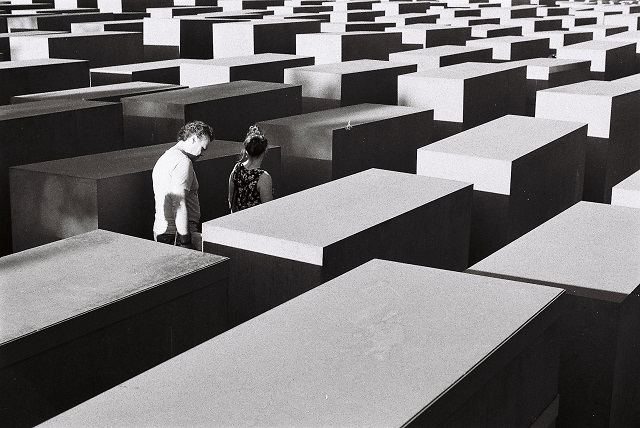
Though the British Labour Party’s anti-Semitism scandal has dominated headlines in the United Kingdom of late, there is a more profound debate with the same theme taking place in Germany. Most worryingly, the fundamental tenets of
vergangenheitsbewältigung—the collective project of coming to terms with the country’s World War II past—are shifting.
This historical reckoning was hard won. During the early post-war era, Germany went through various stages of denial about the horrors committed during the Nazi regime. But in 1968, an intergenerational culture war exploded, as the children of Nazism faced up to the responsibilities of their parents—culminating in the violent excesses of the
Red Army Faction. As historical scholarship documenting the crimes of the Nazi regime continued to pile up in the 1980s and 1990s, the German political establishment reached a consensus that the country’s historic guilt and responsibility must be a central part of its national story.
But since 2015, when Chancellor Angela Merkel announced her policy of
Willkommenskultur (welcoming culture) and opened Germany’s doors to refugees fleeing the conflict in Syria, unease about resurgent anti-Semitism has been growing in the German establishment, and particularly in the Jewish community.
Just in the past year, a stone was
hurled through a synagogue window in Gelsenkirchen, Israeli flags have been
burned at demonstrations, and a Berliner wearing a yarmulke was
assaulted in the street. Worse still, these attacks—sometimes by immigrants—have coincided with the rise of the far-right
Alternative für Deutschland. The AfD is now using its position as the main opposition party in the Bundestag to question the culture of responsibility, even as it promises to protect German Jews from Islamist-inspired anti-Semitism.
Attacks on Jews have sparked outrage from the many Germans who thought such scenes had vanished forever from their country’s streets. But, in addition to the more visible abuses, German Jews have also begun to talk about more
subtle changes in their everyday lives as major German cities like Frankfurt, Hamburg and Berlin grow more multicultural.
Four parallel trends are now challenging Germany’s
vergangenheitsbewältigung. First, the Holocaust is passing from memory into history. As the last survivors and perpetrators die, younger Germans feel less of a real connection to the past. Having a parent who may have been complicit in Nazi crimes is not the same thing as having a great-grandparent who was. It is not surprising that younger Germans feel less historically responsible.
Second, immigrants from predominantly Muslim countries now constitute a growing share of the population. Members of this cohort have no personal links to past German crimes, and they have often been subjected to anti-Zionist indoctrination by regimes seeking legitimacy through solidarity with the Palestinians.
Third, most Germans have never, and will never, meet a Jew, for the simple reason that Jews constitute a vanishingly small share of the population. Frankfurt, home to the country’s second-largest Jewish community (behind Berlin), has only 7,000 Jews, out of a metropolitan-area population of 5.7 million.
Finally, the Israeli government’s increasingly radical and nationalistic embrace of Jewish identity above all else is changing the dynamics of anti-Semitism globally, as anti-Israeli sentiment becomes blurred with hostility towards Jews.
Many who have been observing these trends from a distance—or even from within Germany—are listening for echoes of the 1930s. But, as someone of Jewish heritage who is currently reclaiming his German citizenship, I would argue that the re-emergence of anti-Semitism in Germany has more to do with the country’s global future than with its murderous past. Between the growing talk of
Heimat (homeland) and the
excommunication of Germany’s star soccer player over his photo with Turkish President
Recep Tayyip Erdoğan, it is clear that Germany is trying to figure out how to adapt its national story to a global age.
I recently met with the directors of a Jewish museum in one of Germany’s major cities, and I was struck by the thoughtfulness with which they are approaching the anti-Semitism problem. For starters, their aim is to ‘de-Israelify’ the Jewish question, to show that Jewish history
is German history, as evidenced by countless studies of Jews’ historical contributions to German culture.
Germany’s Jewish community also understands the need to move from a focus on Germany’s special responsibility to talk about coexistence, multiculturalism and interfaith dialogue. The goal is to get more young Germans to meet and engage with Jews.
Most powerfully, the Jewish community is pursuing outreach specifically geared towards new (Muslim) immigrants, who must be made to understand that Jews have historically been the victim, not the oppressor. This effort entails drawing parallels between the discrimination met by immigrants today and that suffered by Jews historically. The hope is to build interfaith bridges within a common culture of the oppressed.
As Germany confronts ever more complex debates about its identity, the country’s elites will need to adopt this philosophy, and do more to encourage dialogue within an increasingly diverse population. The problem that is emerging from today’s identity politics is not just anti-Semitism, but racism in general. And that is just as true in Germany as it is in the UK and other Western countries.
 Print This Post
Print This Post